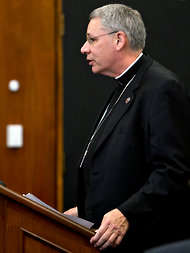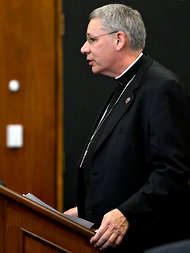 PHOTO: Mary van Balen “Have you celebrated that, Mom?” my daughter asked as I mentioned that this month would mark the beginning of my twenty-seventh year of writing my monthly column, “Grace in the Moment.”
PHOTO: Mary van Balen “Have you celebrated that, Mom?” my daughter asked as I mentioned that this month would mark the beginning of my twenty-seventh year of writing my monthly column, “Grace in the Moment.”
“Well, no. Not really.”
“Well, you should. You should celebrate your accomplishments, and that is a big one.”
I conceded that one ought to celebrate, but wasn’t sure how to do something like that. I mean, shouldn’t someone else plan the celebrating? It seems odd to throw a party for yourself.
“It doesn’t have to be something big. Go out with a friend and have a drink, or go to lunch, or something.”
She had a point. Our lives are busy with work, family, and friends. The house can always use some attention. There is shopping and laundry, and yard work. Who has time to think about celebrations? But we should.
Honoring our achievements is not bragging. It is a way to reverence who we are and the way we contribute to the world. Sometimes by our work. Sometimes just by who we are. Recognizing an accomplishment empowers us to go on, to build on what we have done. It is as much a push to the future as it is a nod to the past. Celebrating milestones is a kind of self-care: making sure we appreciate and nurture the gifts we have.
My daughter was right. When one lives alone, observing life’s small (and not so small) accomplishments can be difficult. There is no spouse or significant other to keep track. To notice, for example, the passage of over two decades of writing. Or of finishing a pivotal chapter in a dissertation. Or preparing more meals at home than eating fast food. Or finally getting a room cleaned out and organized.
Perhaps what deserves celebration is the maintaining of a friendship across many years and many miles. Could be the completion of a work project.
But I think, as a country, we may be better at making lists than we are at honoring life’s special moments.
My daughters are getting good at it as this past weekend attests. I left for the retreat on Saturday with a messy house. The dining room table had scraps of paper, books, receipts, and countless other bits. The sink was full of dishes. My office table was likewise strewn with notes and books, with reminders and rough drafts. I had a wonderful day, energized by both the topic and the people attending, who were generous with sharing of themselves.
But, once the retreat was over, fatigue began to creep in. I opened the door of my house expecting to be overwhelmed by what had been left undone.
Instead I saw a clean kitchen.
“My sister,” I thought and smiled. She had done this before. What a blessing. Then I walked into the living room where a cleaned off table held not one, but two beautiful bouquets of flowers and an envelope. I opened the card: “That song in your heart? It’s beautiful. That dream in your journal? It’s possible. That moment you’ve been waiting for? It’s now…Congratulations.”
Then a beautiful note, written by my oldest, but sent from the hearts of all three daughters.
I sank onto a dining room chair and cried.
“You should celebrate,” my daughter had said.
Despite the miles and states between them, they had found a way to be with me at a special moment. They offered all the good things that celebrations bring: encouragement, joy, and support.
And my sister and her husband? They took my daughter (who had something to celebrate herself: The completion of assembling a new electric motorcycle on schedule for participation in a time trial…) and me out to dinner.
So I write a blog to thank them, and all those who help us mark events in our lives, however small, that give us a reason to notice and give thanks.
I am not sure who told me once that one should grab every reason to celebrate and do just that, but I am echoing the message.
 PHOTO: Mary van Balen October came so fast, I didn’t notice its arrival. That is unusual for me. Decades ago, moved by the exuberant beauty of an October day, I wrote a song celebrating just that. Waiting up til midnight on Sept. 30, I sang in the season, year after year. (see
PHOTO: Mary van Balen October came so fast, I didn’t notice its arrival. That is unusual for me. Decades ago, moved by the exuberant beauty of an October day, I wrote a song celebrating just that. Waiting up til midnight on Sept. 30, I sang in the season, year after year. (see  PHOTO: Mary van Balen Eighteen of us had a wonderful day last Saturday exploring the practice of journaling as a way of prayer. As one participant commented, the “gift of time” is something needed in a lifestyle that has us rushing from place to place without really stopping to notice the people and things that fill our lives. The jeweler’s loupes were a hit. Who knew how beautifully structured and detailed a dragonfly’s body was? Or the geometric patterns of a hemlock cone?
PHOTO: Mary van Balen Eighteen of us had a wonderful day last Saturday exploring the practice of journaling as a way of prayer. As one participant commented, the “gift of time” is something needed in a lifestyle that has us rushing from place to place without really stopping to notice the people and things that fill our lives. The jeweler’s loupes were a hit. Who knew how beautifully structured and detailed a dragonfly’s body was? Or the geometric patterns of a hemlock cone? 
 PHOTO: Mary van Balen In today’s gospel reading, it was the little things the woman noticed when Jesus entered Simon’s house: No one brought water to wash Jesus’ dusty feet; no one greeted him with a kiss; no one wiped his face and refreshed it with oil. Changed by his words of God’s loving forgiveness, she had come to seek him out. Perhaps to give thanks for lifting a burden from her heart and replacing it with hope.
PHOTO: Mary van Balen In today’s gospel reading, it was the little things the woman noticed when Jesus entered Simon’s house: No one brought water to wash Jesus’ dusty feet; no one greeted him with a kiss; no one wiped his face and refreshed it with oil. Changed by his words of God’s loving forgiveness, she had come to seek him out. Perhaps to give thanks for lifting a burden from her heart and replacing it with hope.  Rita Frye PHOTO: Mary van Balen “Well, Hello!” Rita’s voice came over my cell. I couldn’t believe we had connected, expecting instead to leave a message.
Rita Frye PHOTO: Mary van Balen “Well, Hello!” Rita’s voice came over my cell. I couldn’t believe we had connected, expecting instead to leave a message.
 PHOTO: Mary van Balen No, not a “lousy T-shirt.” While admitting to a bit of beach envy, I was happy to receive the bounty of my brother-in-law’s garden and produce from their refrigerator which would not last the week. Michael’s homegrown eggplant, peppers, tomatoes, and potatoes inspired me to create my own ratatouille this morning. I threw in some zucchini, onion, garlic, and fresh basil and thyme snipped in the rain from my potted herb garden.
PHOTO: Mary van Balen No, not a “lousy T-shirt.” While admitting to a bit of beach envy, I was happy to receive the bounty of my brother-in-law’s garden and produce from their refrigerator which would not last the week. Michael’s homegrown eggplant, peppers, tomatoes, and potatoes inspired me to create my own ratatouille this morning. I threw in some zucchini, onion, garlic, and fresh basil and thyme snipped in the rain from my potted herb garden.  Not only do I have lunch and dinner for a couple of days, I have an apartment filled with the earthy aromas of fresh vegetables and herbs. A perfect compliment to a grey, rainy morning.
Not only do I have lunch and dinner for a couple of days, I have an apartment filled with the earthy aromas of fresh vegetables and herbs. A perfect compliment to a grey, rainy morning.  News coverage of the riots and deaths stemming from rage at the short movie, “Innocence of Muslims” reminded me of a
News coverage of the riots and deaths stemming from rage at the short movie, “Innocence of Muslims” reminded me of a  “Blue Moon Over Cincinnati” Bill Ingalls/NASA via Getty Images (Originally published in the Catholic Times, September 9, 2012 © 2012 Mary van Balen)
“Blue Moon Over Cincinnati” Bill Ingalls/NASA via Getty Images (Originally published in the Catholic Times, September 9, 2012 © 2012 Mary van Balen)

 The Catholic hierarchy is notoriously secretive. When they backslide again it will be hard to catch them, everyone involved must be hyper vigilant if kids are truly to be safe.
The Catholic hierarchy is notoriously secretive. When they backslide again it will be hard to catch them, everyone involved must be hyper vigilant if kids are truly to be safe.